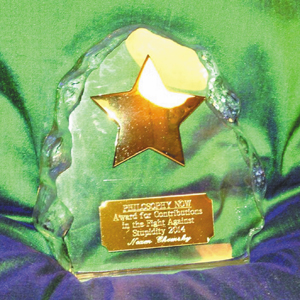
Your complimentary articles
You’ve read one of your four complimentary articles for this month.
You can read four articles free per month. To have complete access to the thousands of philosophy articles on this site, please
Books
Decoding Chomsky by Chris Knight
Peter Stone detects an attempted literary left-wing hatchet job (an ice-pick job?) on Noam Chomsky.
Noam Chomsky is both a central figure in the field of linguistics and a leading public intellectual. In both capacities he is an incredibly divisive figure: people either love him or hate him. Chris Knight, a senior research fellow in the Anthropology Department at University College London, hates him. And for that reason, he wrote Decoding Chomsky: Science and Revolutionary Politics (2016) – a nasty, mean-spirited, vitriolic, ideologically-driven hatchet job. While Knight, unlike most of Chomsky’s critics, attacks him from the Left (Knight is a Marxist clearly hostile to Chomsky’s anarchism), the level of venom on display here exceeds that of all but the most unhinged of Chomsky’s detractors on the Right. Knight claims that his goal in Decoding Chomsky is “to serve justice on Chomsky the scientist without doing an injustice to Chomsky the conscience of America” (pp.xii-xiii), which suggests that the book will offer a fair critique of Chomsky’s ideas in linguistics while paying due deference to Chomsky’s politics. But Knight intends a far more comprehensive demolition of Chomsky than this. Chomsky’s work in linguistics, Knight contends, is utterly worthless. Worse than that, his work has both led the field of linguistics astray and played a pivotal role in weakening the political Left over the last sixty years.
Knight offers no systematic exposition of Chomsky’s linguistic work or how it changed over time. A complete newcomer to Chomsky’s linguistics will therefore have great difficulty figuring out from Decoding Chomsky just what Chomsky thinks and why. Instead of laying out Chomsky’s approach to linguistics systematically and exploring its strengths and weaknesses, Knight assumes from the start that the entire approach is and was of no value whatsoever. Chomsky’s linguistic work is “labyrinthine nonsense”, “a contribution of baffling incomprehensibility which, on close examination, turns out to make no sense at all” (pp.11,13). Bold words indeed coming from an anthropologist with “no theoretical training in linguistics” (p.ix) who approached Chomsky’s linguistics like an anthropologist studying an alien tribe (p.x). Instead of critically evaluating Chomsky’s project, Knight takes it upon himself to explain how, “if the assumptions of the project were a fiasco from start to finish,” it was able to have such an enormous impact upon the field of linguistics and beyond (p.184).
Being a Marxist, Knight’s explanation for Chomsky’s success as a linguist hinges upon Chomsky’s usefulness for the ruling class. Following the various twists and turns of Knight’s argument can prove tricky, so bear with me. Once upon a time, says Knight, “the standard paradigm in ‘scientific’ psychology had been behaviourism” (p.23). And the rulers of the world “welcomed behaviourism because it seemed to promise enhanced techniques for mass education, pacification, political manipulation and control” (p.24). In helping to launch the modern cognitive revolution, Chomsky challenged behaviourism at its very roots, for example in his famous review of B.F. Skinner’s Verbal Behavior (1957). One would think that this challenge to a scientific theory embraced by the ruling class would please Knight. But Knight sees the fall of behaviourism as stemming from ruling class needs just as much as its rise. “Behaviourism had perfectly suited administrators, content to manipulate people through punishment and reward, targeting not their minds, but their emotions and bodies. From the standpoint of these people, it had hardly mattered what their powerless victims thought. But now that communication had become a central concern, mental states did matter” (emphasis in original; p.50). “It was Corporate America’s urgent need for a mind-centered psychology,” concludes Knight, “that at the deepest level spelt doom for behaviourism and guaranteed the cognitive revolution’s rapid and stunning success” (p.29).

PN Award for the Fight Against Stupidity. Won by Noam Chomsky in 2014.
So what precisely did Corporate America need, once behaviorism was no longer useful to it? Behind the cognitive revolution lay the demands of the Pentagon, and “among the most heady” of the dreams of the Pentagon planners “was the vision of a universal language to which they held the key” (p.x). This led the Pentagon to throw large amounts of money at machine translation, with the goal of rendering possible ready translation across all languages. Chomsky’s own work, writes Knight, was part of this project.
Chomsky himself has always denied that his work had any relationship to machine translation, as have many other commentators on Chomsky’s work (see for example, pp.60-64). Indeed, Chomsky rejected the very idea of machine translation because “realistically, developments in this area would probably be based on trial-and-error statistical methods, reliant on the development of vast memory banks” (p.57). Translation via computer, in other words, would depend not upon any linguistic theory but upon sheer computational brute force. Knight acknowledges this, and admits that “nothing Chomsky ever produced made the slightest practical contribution to American military power” (p.ix). But none of this stops Knight from both castigating machine translation as a project doomed to failure – he refers to it as “the great folly” in the title of Chapter 8 – and associating Chomsky with it.
Let me reiterate Knight’s argument thus far. Knight attributes to Chomsky a goal – the development of machine translation – that Chomsky himself denies ever having. He then attacks Chomsky for pursuing this goal because of its serviceability to the Pentagon. He then further attacks Chomsky for failing in his pursuit of this goal, even though Chomsky himself spelled out the reasons for believing that the goal was unattainable years earlier. Are you getting a sense of how desperate and contrived this argument is?
But the best is yet to come. Chomsky’s (imaginary) pursuit of machine translation on behalf of the Pentagon may have failed, but his intellectual work served a deeper purpose for the ruling class. (Were the Pentagon planners who wanted machine translation aware of this deeper purpose? Knight never says.) It was the Cold War, after all, and far too many people were being attracted to Marx’s ideas for the comfort of the American ruling class. “To break the spell of Marxism…the world’s dominant superpower needed to sever all connection between political activism and science. Science as a global force had to be deprived of all political will; meanwhile, any internationalist activism which remained had to be deprived of guidance or inspiration from science” (pp.203-204). Destroying Marxism meant “shattering the all-important junction between theory and practice. Chomsky’s intellectual status, perceived moral integrity and impeccable left-wing credentials made him the perfect candidate for this job.” (p.193)

Red Army cap badge for the fight against capitalism. Worn by Noam Chomsky never.
Chomsky, then, and the cognitive revolution in which he played such a crucial role, served a vital need of the ruling class by separating theory from practice. This meant discouraging scientists from working with ordinary people to change the world for the better. “The result has been a tongue-tied science and a correspondingly mindless activism. It is a situation in which science and activism are incapable of sharing the same language or of collaborating in pursuit of any shared purpose at all.” (p.197)
If Chomsky’s work in linguistics has had this effect, then neither Chomsky nor any of his millions of admirers have noticed it yet. This bizarre claim is also directly contradicted by Chomsky’s own repeated defense of the importance of popular science education. Here’s a representative quote from Chomsky, drawn from a polemic against postmodernism:
“Many scientists, not too long ago, took an active part in the lively working-class culture of the day, seeking to compensate for the class character of the cultural institutions through programs of workers’ education or by writing books on mathematics, science, and other topics for the general public. Nor have left intellectuals been alone in such work, by any means. It strikes me as remarkable that their left counterparts today should seek to deprive oppressed people not only of the joys of understanding and insight, but also of tools of emancipation, informing us that the ‘project of the Enlightenment’ is dead, that we must abandon the ‘illusions’ of science and rationality – a message that will gladden the hearts of the powerful, delighted to monopolize these instruments for their own use.”
(Chomsky on Democracy and Education, 2003, p.96).
If anyone believes that scientists and ordinary people should work together for a better world, then it’s Noam Chomsky. But the real Chomsky has almost nothing to do with the Chomsky depicted in Knight’s little exercise in character assassination.
Knight spares no opportunity to paint Chomsky’s every thought and deed in the blackest possible terms. According to Knight, Chomsky did not write Cartesian Linguistics (1966) because he saw interesting affinities between his own work on mind and the rationalist philosophical tradition of René Descartes; he wrote it because he wanted to disown and repudiate his former mentor, Zelig Harris, and this required inventing an alternative source for many of his ideas (p.142). According to Knight, Chomsky did not defend the free speech rights of political scientists whose views he opposed because he was a free speech absolutist (even though it is an obvious position for an anarchist to take). Rather, “Chomsky’s position on academic freedom uncannily resembled the MIT management line on these issues.” (p.38)
Decoding Chomsky is not a critique of a body of work in linguistics; it is an attempt to demonise a man for his perceived political deviations, even though that man happens to be on the same side of the political spectrum as the man who is demonising him. Reading Decoding Chomsky taught me something about the mindset of the prosecutors in the Moscow Show Trials.
If you already loathe Chomsky, then you might enjoy reading Decoding Chomsky just to watch Knight kick him around. But if you want to learn something about Noam Chomsky – his linguistics, his politics, and any possible relationship between the two – then this book is not for you. Whatever his faults, Noam Chomsky deserves better than this.
© Peter Stone 2018
Peter Stone is an associate professor of political science at Trinity College Dublin.
• Decoding Chomsky: Science and Revolutionary Politics, by Chris Knight, Yale University Press, 2016. 285 pages, £18.99 hb, ISBN: 978-0-300-22146-6









